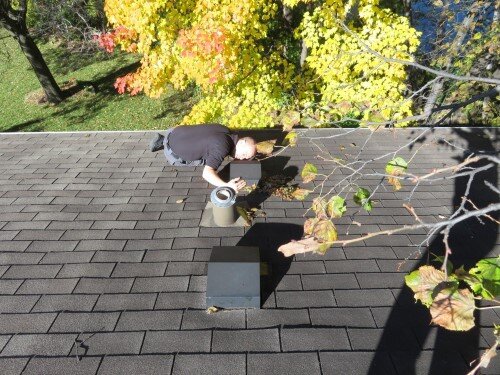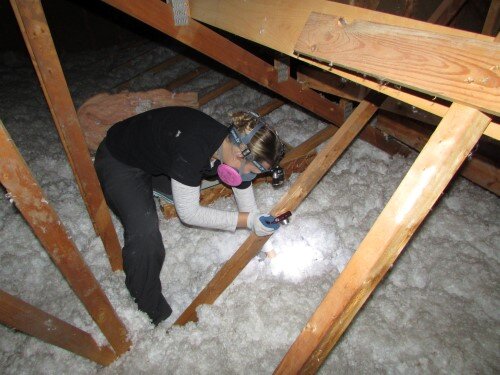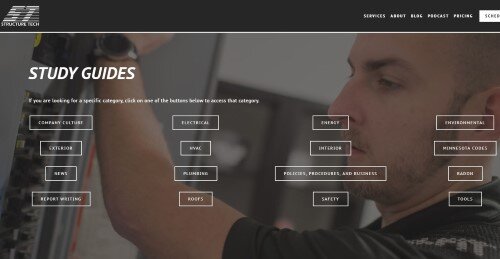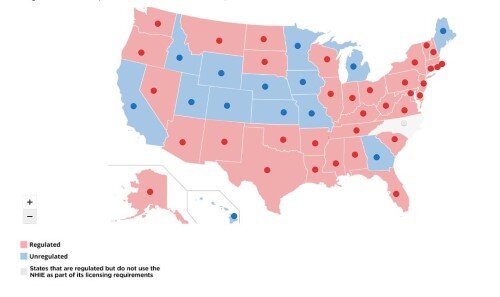Today I’ll share my advice on how to become a home inspector. I blogged on this topic back in 2011, and again in 2016, but things change and it’s time for another update. I’m writing this because I get a ton of phone calls and emails from people who want to get into the home inspection business. Instead of sharing the first thing that comes into my head during these conversations, I’m putting down all of the most frequently asked questions right here.
Q: How can I learn to be a home inspector?
A: Start with a school. That’ll make up about 5% of what you’ll need to know. The rest of it you’ll need to learn in the field by going along with an experienced home inspector.
Q: What’s the best home inspection school?
A: I’ve only attended one home inspector training school, and it was in 2004. I took a weeklong course and I wasn’t impressed, so I won’t share the name of the school. I’ve heard good things about The ASHI School from home inspectors who have gone through that training, but I have no firsthand experience with that school. I have people on my team who have attended Inspection Certification Associates as well as Kaplan, and they spoke highly of those schools.
But as I said, a home inspection school is only the tip of the iceberg. You need to do a tremendous amount of self-study and attend a large number of home inspections with intentionality before even approaching competency.
Q: How can I get hands-on home inspection training?
A: Home inspection schools often include some hands-on training, but it’s minimal. To get real-life home inspection experience, one must attend home inspections with experienced home inspectors. I only know of two ways to do this: reach out to home inspectors and ask them to teach you, or get hired by another home inspection company who will give you the training.
Getting hired by a home inspection company who will give you the training is pretty straightforward, but reaching out to strangers to learn this business and potentially be viewed as a competitor is downright scary for a lot of people.
If I were trying to get into this business and I wanted to get training from an experienced home inspector, I’d hit the phones hard. I’d call every home inspector in my area until I found someone who was willing to train me, and I’d be prepared for a lot of rejection. But eventually, I’d surely find someone. I’d offer to be an assistant inspector in exchange for the opportunity to learn. I don’t know any home inspector who wouldn’t want someone to set their ladder up, go turn the dryer on, get a towel out of my truck (quickly!), etc.
If I couldn’t find someone who was interested in that proposition, I’d offer to pay to learn. If you end up spending $100 per ridealong inspection and you attend 100 home inspections to get a good grasp on what you’re supposed to be doing, I’d call that a bargain.
Oh, and by the way, many home inspectors get “funny” about allowing ridealongs because they’re afraid they’ll be training their competition. This is partly true, but in a larger market like the Twin Cities, having a few more home inspectors enter the business won’t ever make a bit of difference to me. Thousands of houses are sold every month here in the Twin Cities. If a new home inspector enters the market and instantly starts doing two home inspections a day, would I ever feel that impact? No way. I’ve found that I learn a lot while teaching others, however. If someone is going to enter this business, I’d rather they be a competitor who does things the same way that I do and charges a similar fee; not some hack who charges $200 and gets their home inspections done in an hour.
Q: Do you hire and train people without home inspection experience?
A: For sure. We prefer to hire people with a strong background in the building trades, but that’s not a requirement. We hire for personality and the ability to learn. Check out our employment page for more info.
Q: How long does it take to train a new home inspector?
A: It depends. My traditional answer has always been four to six months, but here at Structure Tech, we’re working very hard to change that. We’re developing a new training program for new inspectors at our company that should beat the pants off of anything else out there. The goal is to get new inspectors trained within three months.
Q: What are the physical requirements?
A: Less than most trades, more than most desk jobs. My humble opinion is that one must be comfortable walking roofs with at least a 6/12 pitch, be able to carry a 28′ extension ladder, be comfortable climbing around in attics, into and out of window wells, under sinks, and crawling around in crawlspaces. Those aren’t requirements to enter this profession, and home inspectors are not required to walk roofs or climb through attics, but I think that anyone who is unable or unwilling to perform those tasks would have a very hard time establishing themselves in this profession, partly because there are plenty of other people in this profession who are willing and able to do those things.

Joe on a roof

Tessa in an attic
Q: What are the licensing requirements in Minnesota?
A: There is no such thing as licensing here in Minnesota. Most states have it, we don’t.
Q: What study materials do you recommend?
A: As long as you’re already here on my blog, start with this. I’ve painstakingly reviewed every blog post I’ve ever written and I’ve categorized all of the blog posts that new home inspectors at my company need to read. Check out our Home Inspector Study Guide.

-
Also, pick up a copy of the National Home Inspector Exam (NHIE) Home Inspection Manual and the NHIE Study Guide. This exam is used in most states that have licensing requirements (the red states below), and is used by ASHI as a prerequisite to achieving “ASHI Certified Inspector” status. As far as I know, the ASHI Store has the best pricing on these books.

-
The Prescriptive Residential Deck Construction Guide – to quote myself, this should be required reading material for anyone who builds or inspects decks. The building code is quite difficult to fully follow and understand when building a deck, but this guide has taken all of the building code requirements scattered throughout the IRC and put them into one location.
-
Electrical Inspection of Existing Dwellings – I call this the home inspector’s Bible for electrical inspections. Every home inspector ought to own this book. This book should be read, re-read, and kept handy for reference. Even for those well-versed in electrical codes, this book contains many helpful electrical history notes.
-
Code Check books. There is no other quick-reference book that makes it easier to find the exact code requirements you’re looking for. These books reference national codes which are frequently changed at the state level, so they’re never 100% applicable, but they at least make it quick and easy to know where to look, and the illustrations are fantastic.
-
For future home inspectors in Minnesota, get familiar with the Minnesota codes.
There is nothing Minnesota-specific related to electrical; we adopt the entire electrical code. At the time of this writing, we’re still on the 2017 version of the NEC.
As ongoing reading materials for all home inspectors, experienced or not, here is some of my favorite reading material for ongoing education:
-
The ASHI Reporter – ASHI’s monthly magazine. ASHI members get a free subscription, but the digital version of the magazine is free to everyone online.
-
Building Science – this is a great resource for building science information. Subscribe to their newsletter at the bottom of their homepage.
-
Energy Vanguard Blog – great blog about insulation, HVAC, building science, and the like. Go halfway down the page to subscribe.
-
The Journal of Light Construction – I get the paper edition, but their website has lots of great info as well.
-
The Family Handyman – this is also a great magazine for every motivated, handy homeowner. Again, I get the paper edition, but their website is excellent and seems to dominate search results related to all types of home improvement projects, and for good reason.
